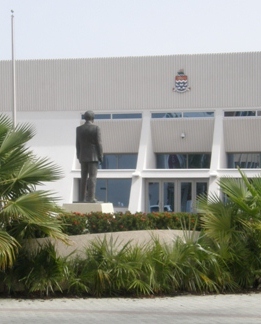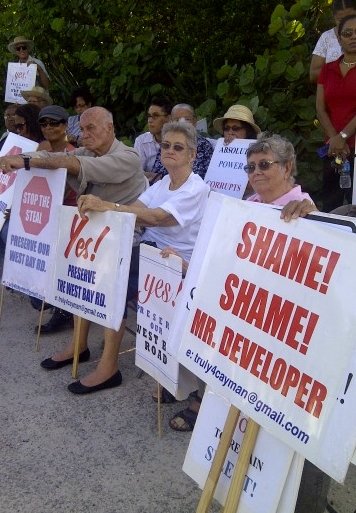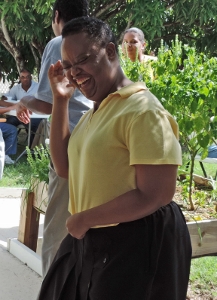Archive for December 10th, 2013

Future LA meeting dates now revealed
 (CNS): The PPM government has set a timetable for the meetings of the Legislative Assembly for the remainder of the 2013-2014 session for the first time in many years. In the recent past meetings have been on an ad hoc basis, usually at the direction of the premier and before that the leader of government business. Members were often given very short notice, while the press and by extension the public were rarely formally informed at all and when they were, not until the eve of a meeting. However, Premier Alden McLaughlin had promised members that he would establish a timetable. The House resumes tomorrow for the remainder of the meeting that began in October and the next meeting will be in the New Year.
(CNS): The PPM government has set a timetable for the meetings of the Legislative Assembly for the remainder of the 2013-2014 session for the first time in many years. In the recent past meetings have been on an ad hoc basis, usually at the direction of the premier and before that the leader of government business. Members were often given very short notice, while the press and by extension the public were rarely formally informed at all and when they were, not until the eve of a meeting. However, Premier Alden McLaughlin had promised members that he would establish a timetable. The House resumes tomorrow for the remainder of the meeting that began in October and the next meeting will be in the New Year.
Meeting dates for the remainder of the current Session are 29 January, 2014, and then 12 March. Following the closure of the March meeting the Legislative Assembly will move into a new session for 2014/15 and that will open with the budget meeting on 2 May.
"We have been working with the Legislative Assembly and Madam Speaker Hon. Juliana O’Connor-Connolly to develop a calendar so that all members of the Legislative Assembly can know when their presence will be required in the Honourable House,” McLaughlin said in a release from his office. “It is only fair that everyone be made aware so that they can plan and schedule their time with constituents and families.”
The sitting tomorrow is scheduled to open at 10am and will cover a number of bills, including the long awaited and much anticipated National Conservation Law.
Also on the order paper for the remainder of this meeting is the equally anticipated Standards in Public Life Bill, which will introduce a new regulatory and enforceable regime for governing the interests and conduct, not just of politicians but all public servants.
Other legislative changes include amendments to the Notaries Public law and the Insurance law but a full agenda for the remainder of this meeting has not yet been made public.

Car torched in West Bay
(CNS): A car parked in a West Bay road was set on fire Monday night in what police believe was an act of arson. An RCIPS spokesperson said that West Bay detectives are now investigating the blaze after two suspects were seen by witnesses fleeing the scene of the burning vehicle. Police and fire services attended the scene having received a report about the blaze in Flute Lane, off West Church Street, at about 9:25pm in which a Chrysler PT Cruiser, was destroyed. Enquiries at the location suggest that two people were seen running away at the time of the fire but police have no descriptions of the people. Anyone who was in the area at the relevant time, and saw or heard anything suspicious, is asked to contact West Bay police station on 949-3999, the RCIPS tip line 949-7777 or Crime Stoppers 800-8477(TIPS).

Closure was ‘fait accompli’
 (CNS): Local defence attorney Anthony Akiwumi argued that the closure of the West Bay Road was an unconstitutional ‘fait accompli’ which gave the people of the Cayman Islands no right of appeal and lacked transparency. Presenting the case on behalf of the four West Bay ladies who have challenged the controversial closure in the courts, Akiwumi pointed to the right of way that people have enjoyed on the road for more than one hundred years, the petition signed by more than 4,000 residents, as well as the cultural significance of the road. But the main thrust of his submissions before Justice Alex Henderson Monday was simply that the closure was unlawful.
(CNS): Local defence attorney Anthony Akiwumi argued that the closure of the West Bay Road was an unconstitutional ‘fait accompli’ which gave the people of the Cayman Islands no right of appeal and lacked transparency. Presenting the case on behalf of the four West Bay ladies who have challenged the controversial closure in the courts, Akiwumi pointed to the right of way that people have enjoyed on the road for more than one hundred years, the petition signed by more than 4,000 residents, as well as the cultural significance of the road. But the main thrust of his submissions before Justice Alex Henderson Monday was simply that the closure was unlawful.
Representing Alice Mae Coe, Annie Multon, Ezmie Smith and Betty Ebanks in their suit against the governor, the minister, the attorney general, the NRA and, at its request, Dart Realty Cayman Ltd, Akiwumi opened his clients' case to a packed courtroom. Facing an army of lawyers and QCs on the defence benches, Akiwumi argued that the way government had gone about the closure of the West Bay Road was unlawful and should not have happened behind closed doors.
He suggested that many of the issues surrounding the case regarding the jurisdiction of the court, time lines and other arguments from the defence were nothing more than a distraction. The lawyer asked the judge to answer the question of whether or not the process was lawful because if it was lawful, his case was over. Akiwumi argued forcefully, however, that the process was not as it was not compatible with the Constitution or the Bill of Rights.
He pointed out that there was no way for the people to appeal the decision or file objections as the details of the agreement were always kept from the public eye and nothing was officially published until after the road was gazetted on 13 March, contravening section 18 of the BoR.
“No one really knew until after the fact,” he told the court. “The residents of West Bay and of the island were presented with a fait accompli.”
Akiwumi said that the closure of the road via the roads law was unconstitutional because it did not comply with the section of the constitution which demands government acts in a reasonable and transparent way. It also undermined long held easement and access rights. He argued that the closure of the road under the roads law may have given possession to Dart but it did not take away the people’s right of access.
Arguing over the question of jurisdiction, Akiwumi said the trigger date was not the original signing of the ForCayman Investment alliance agreement in December 2011 but the order to gazette the closure of the road. He said the ladies filed their suit as soon as they were aware that government was intending to discuss that order in Cabinet and it was that order which they could then oppose in a court of law.
Although he focused on the legality question and the lack of transparency regarding the process, Akiwumi did not neglect the emotional elements of the case and the significance of the West Bay Road as an historical through route to George Town for over a century. He also addressed the allegations regarding his clients that they were nothing more than a nuisance.
“That is not true,” he said, adding that the four women were representing a wider genuine concern in the community about the way the road was closed.
Akiwumi said the case had nothing to do with objecting to development but it was about the road as well as the access it provides to the beach. He told the court that the strip of road which is now inaccessible was once the first point along the West Bay Road where Cayman’s famous Seven Mile Beach could be seen and it was now impossible to see Seven Mile Beach from any road.
“Tourists wonder where it is,” he said.
The attorney who has submitted all of the evidence relating to the case in writing closed his opening summary at around 3:30pm on Monday afternoon and gave way to the first of the QCs on the defence side.
Richard Keen QC, who is representing the government and the NRA, began the defence by suggesting the process was transparent and that it was closed correctly and lawfully under the roads law, which removed any public accessthat a road would afford. The lawyer argued that this was a political decision lawfully made and lawfully executed. He also spent time arguing that the trigger point for any action was not the gazetting of the road but when the agreement was signed in December 2011, making the suit out of time.
Keen will continue his presentations in Court 4 Tuesday during the trial, which is open to the public and scheduled to run throughout this week.

Horses dress up for festive dressage
 (CIEF): ‘Jingle Bells’, one of the world’s most well known festive songs tells of the delight of hooking your horse up to an open sleigh, cracking the whip and dashing together through the snow, bells all ‘a-jingle’. You won’t see any snow at the Equestrian Centre on Linford Pierson Highway this weekend but on Saturday 14 December at 8am until noon, you will see horse enthusiasts from all over the island gather together there for their annual Christmas Fun Show.First up is the most popular and hotly contended ‘fancy dress’ competition. But this is no ordinary fancy dress competition since the horses are the ones to be dressed up.
(CIEF): ‘Jingle Bells’, one of the world’s most well known festive songs tells of the delight of hooking your horse up to an open sleigh, cracking the whip and dashing together through the snow, bells all ‘a-jingle’. You won’t see any snow at the Equestrian Centre on Linford Pierson Highway this weekend but on Saturday 14 December at 8am until noon, you will see horse enthusiasts from all over the island gather together there for their annual Christmas Fun Show.First up is the most popular and hotly contended ‘fancy dress’ competition. But this is no ordinary fancy dress competition since the horses are the ones to be dressed up.
Sneak along at 8am to see the start of the competition and cast your own votes a to who you think should win! Katie Slagel from Z99’s Breakfast Show is judge and will have the unenviable task of picking a winner on the day.
Entry is free to anyone who wants to come along and watch and join in the fun. While visitors are watching the riders negotiate the western trail pattern competition, the traditional gymkhana games and the nail biting jumping competition, they can play the fun Christmas games set up at the side stalls, make a Christmas craft, ride a pony at the pony park or munch on something sweet from the bake stall.
Once the bells start to jingle you can be sure that the big man in red is not far away. The Cayman Islands Equestrian Federation, the host of this event, does not disappoint and kids will be delighted to be able to climb up into Santa’s wagon, snap a photo with St.Nick and hand him those last minute list updates for the 25th December.
Milly Serpell, President of the Cayman Islands Equestrian Federation said “ This is one of my favorite shows of the year, everyone loves the fancy dress parade and we have lots of extra fun planned this year in the pony park. We are also excited to watch a special dressage display by Jessica Mctaggart one of our elite international riders’.
If you check out the full version of ‘Jingle Bells’, you’ll see that the driver of the sleigh is full of jollity, merriment and high spirits. If you go down to the Equestrian Centre this Saturday you can guarantee a laugh and you’ll probably have just as much fun as he did, if not more.

CIG marks international disabilities day
 (GIS): Celebrations at the Lighthouse School (LHS) and Sunrise Centre marked International Day of Persons with Disabilities on Tuesday, 3 December. In Red Bay the Lighthouse School hosted an open house from 9.00 a.m. – 3.00pm, that showcased the potential of its 105 primary and secondary students. Young people began the day by leading a brief ceremony that included a number of musical and dance performances. They also guided visitors on tours of the school, including displays of handmade crafts and calendars which they had created for sale. Guests were also able to interact with students in classrooms.
(GIS): Celebrations at the Lighthouse School (LHS) and Sunrise Centre marked International Day of Persons with Disabilities on Tuesday, 3 December. In Red Bay the Lighthouse School hosted an open house from 9.00 a.m. – 3.00pm, that showcased the potential of its 105 primary and secondary students. Young people began the day by leading a brief ceremony that included a number of musical and dance performances. They also guided visitors on tours of the school, including displays of handmade crafts and calendars which they had created for sale. Guests were also able to interact with students in classrooms.
Speaking at the opening ceremony Education Minister Tara Rivers, told the audience: “Today’s event reminds us to see possibilities, and to celebrate the contributions that persons with disabilities make in our community.” She also reiterated the ministry’s commitment, “to work towards breaking barriers and opening doors to facilitate inclusion, equal access, and the protection of rights for all persons with disabilities.”
Nearly 100 students aged five to 18 years are enrolled in the school’s primary and secondary programme. Its Early Intervention Programme supports more than 100 pre-schoolers aged birth to five years.
As part of celebrations Radio Cayman’s daily chat show “Talk Today” broadcast live from the Lighthouse School. Special guests were Principal Carla MacVicar, Sunrise Centre Director Shari Smith, and Lighthouse student – Jordan McLean.
Discussions focused on barriers faced by Lighthouse School students and Sunrise Centre clients. Guests also updated listeners on the National Disability Policy. In addition Jordan shared his thoughts on the day’s events, and explained how attending LHS fitted in with his dreams of someday moving on to tertiary education.
Meanwhile, in West Bay, the Sunrise Centre for adults with disabilities hosted a barbecue lunch from 11.00 a.m.-2.00 pm for staff and clients. Forty-nine persons with a wide range of needs are presently enrolled at the centre, which has 18 staff. Sunrise celebrated its 27th anniversary last November.
At the Government Administration Building in central George Town, Deputy Governor Franz Manderson, Chief Officer Mary Rodrigues and Cabinet Secretary Samuel Rose also took part in a photo-opportunity to mark the international observance. They were joined by a number of civil servants wearing yellow to show support for persons with disabilities.

Minister seeks approval for gender convention
 (CNS): The minister with responsibility for gender affairs has made an official request to have the UK extend its part in the Convention on the Elimination of All Forms of Discrimination Against Women (CEDAW) to the Cayman Islands. Tara Rivers submitted the request to Governor Helen Kilpatrick Monday, ahead of today’s international human rights celebrations. The UK will then assess the current equality regime in Cayman and, if it feels the government can meet the obligations, the treaty will be extended. The convention will offer support to efforts being made and provide a catalyst to examine any lingering areas of discrimination.
(CNS): The minister with responsibility for gender affairs has made an official request to have the UK extend its part in the Convention on the Elimination of All Forms of Discrimination Against Women (CEDAW) to the Cayman Islands. Tara Rivers submitted the request to Governor Helen Kilpatrick Monday, ahead of today’s international human rights celebrations. The UK will then assess the current equality regime in Cayman and, if it feels the government can meet the obligations, the treaty will be extended. The convention will offer support to efforts being made and provide a catalyst to examine any lingering areas of discrimination.
Officials said it would help them develop strategies for solutions to address inequality between women and men and boys and girls.
The intentions of the Cayman Islands Government to sign onto CEDAW date as far back as 2004, and commitments have also been made at various Overseas Territories Consultative Council meetings.
The last legislative step in the process of meeting the UK’s requirements for CEDAW extension was the passage of the Gender Equality Law, 2011, which came into effect almost two years ago. This law prohibits discrimination in employment and related matters and also serves as local “enabling legislation” that upholds the principles of CEDAW.
“As the minister responsible for gender affairs, and as a woman, I have a keen interest to represent and advocate for the advancement of women and gender equality in the Cayman Islands,” said Rivers.
“CEDAW is the only core international human rights treaty that the Cayman Islands has yet to sign onto. This most recent request to have CEDAW extended is a reflection of the Government’s commitment to ensuring equality between women and men and promoting a culture of human rights in the Cayman Islands. Efforts such as these which strive toward gender equality help us create a more positive and equitable future for our sons and daughters and a healthier and more productive society.”
The cornerstone of CEDAW is the principle of equality between men and women and the prohibition of discrimination, which affects women’s enjoyment of political, economic, social, cultural, civil and other rights on an equal basis with men. By accepting CEDAW, countries commit themselves to ending discrimination against women in all forms so that they – along with men – can enjoy all of their human rights and fundamental freedoms.
“As the first female governor of the Cayman Islands, I am pleased to witness this significant milestone in our human rights history,” said Governor Kilpatrick, noting the progress over the years towards gender equality in Cayman and the now strong legal framework for non-discrimination. “I hope to do what I can to champion the rights of women and to support the efforts to have the CEDAW extended so that all Caymanians and residents have the opportunity to shape our future.”
Countries that have ratified CEDAW are legally obligated to work towards implementing its provisions and are also committed to monitoring and reporting on the measures they have taken to comply with their treaty obligations.
Senior Policy Officer (Gender Affairs) Tammy Ebanks stated that despite the current high levels of compliance with many of these obligations, the benefits of having CEDAW extended to the Cayman Islands include providing the Gender Affairs Unit with easier access to technical and other resources and expertise in the area of gender affairs and also opportunities to build relationships and share best practices and policy recommendations with other countries.
Often described as an international Bill of Rights for women, CEDAW was adopted in 1979 by the UN General Assembly and has been ratified by almost every single member of the United Nations. The only British Overseas Territories in the Caribbean to have CEDAW extended so far are the British Virgin Islands and the Turks and Caicos Islands. Extension occurred in 1986 in both Territories, when the UK ratified CEDAW.

PA ordered to find records
 (CNS): The acting information commissioner has ordered the Ministry of Education, Employment & Gender Affairs to go back and look again for records requested under a freedom of information application regarding documents used in a Human Rights Committee report published in 2007. Jan Liebaers found that the ministry did not make reasonable efforts to locate the records, as required in the law, when they told the applicant that the records he wanted did not exist. In this latest ruling, among the many procedural problems highlighted, the acting commissioner found, once again, that there was poor record keeping and ordered the ministry to get its house in order.
(CNS): The acting information commissioner has ordered the Ministry of Education, Employment & Gender Affairs to go back and look again for records requested under a freedom of information application regarding documents used in a Human Rights Committee report published in 2007. Jan Liebaers found that the ministry did not make reasonable efforts to locate the records, as required in the law, when they told the applicant that the records he wanted did not exist. In this latest ruling, among the many procedural problems highlighted, the acting commissioner found, once again, that there was poor record keeping and ordered the ministry to get its house in order.
Liebaers pointed to the numerous past occasions commented on by the Office of the Information Commissioner (ICO) in respect of the poor record keeping standards applied by some public authorities. In this case, the records were generated by a government committee and the ICO raised concerns about the confusion surrounding who is responsible for keeping the records of committees, especially when, as was the case in this hearing, the committee no longer exists.
“This is a highly unsatisfactory state of affairs since committees perform important work, and their actions and decisions should be properly recorded and maintained over time,” he said. “Some committees in particular, such as the HRC in the present case, make decisions that may have a significant impact on individuals and organizations, and its records – like all government records — should be maintained in accordance with the provisions of the National Archive and Public Records Law.”
This particular hearing was triggered when an applicant seeking documents that were used to write a human rights report, which included details about him which he felt needed to be amended, was told the relevant records did not exist. However, he believed they did and in order to prove that the report needed to be changed he requested all of the documents that had been used in the making of it.
During the course of the appeal the acting commissioner found that there obviously were relevant documents in existence somewhere because there was a reference to them in correspondence with the applicant as well as in the report.
Therefore, Liebaers found that the authority did not look hard enough and did not make the necessary effort to find the records, and he told them to try again. He pointed out that although the records related to the Human Rights Committee, no one contacted the Procedural Sub-Committee involved in making the report or the former chair of that committee.
“This seems to me to be a serious flaw as he would be a person who might reasonably be expected to hold records of the Committee’s activities,” Liebaers noted.
The acting commissioner also raised the point that while the public authority in question says the records do not exist, it has not explained why they no longer exist or what has happened to them.
“The Ministry has not provided any explanation of why these records — which they were responsible for at the time of their creation — apparently no longer exist,” he notedin the decision. “In the course of the appeal the Applicant made an email available to the ICO which dates from just before the HRC Report was issued and in which a member of the HRC stated that the HRC at that time was making inquiries and expected to receive further documentation from various parties on the Applicant’s case. Similar statements are also included in the HRC Report itself, for instance at paragraphs 56, 59 and 60.”
Given that many important pieces of information were not provided by the ministry in the explanation of its search efforts, Liebaers concluded that the rigour and efficiency of the search conducted by the ministry was inadequate. He said the education ministry did not meet the requirement of the law to make reasonable efforts to find the records.
The acting commissioner gave the authority 30 days to either find the missing documentation or supply an affidavit listing the efforts made to locate the records.
See the decision in full here.